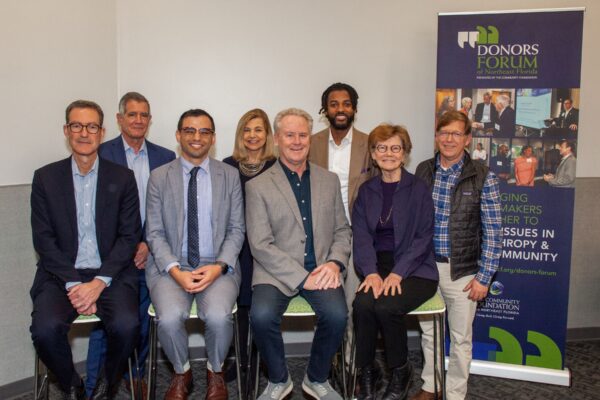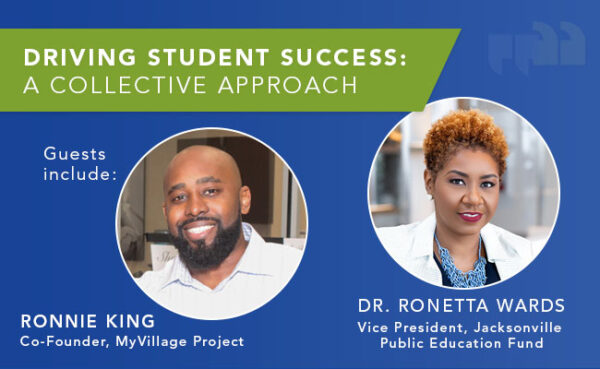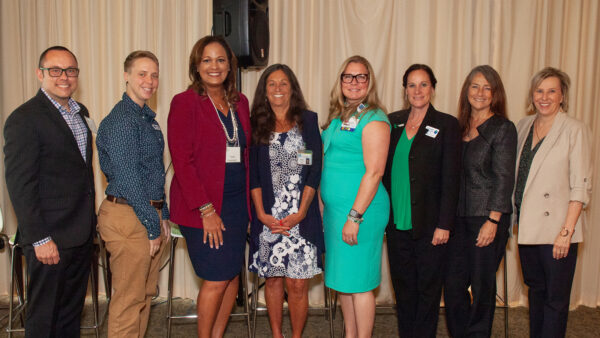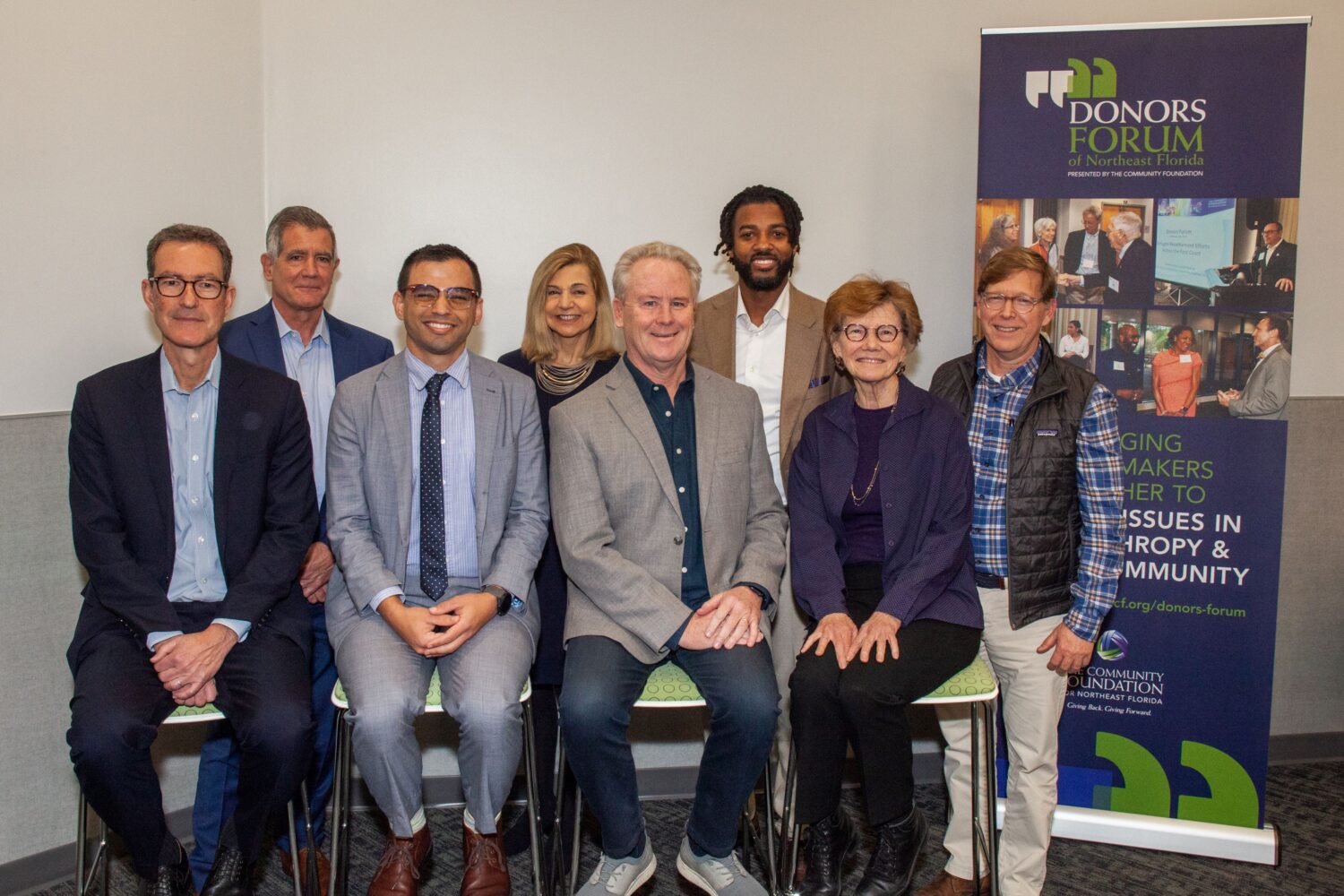On November 30, 2023, The Community Foundation for Northeast Florida hosted a Donors Forum in partnership with the Arthur Vining Davis Foundations on The Philanthropic Case for Local Journalism, to explore the growing interest in philanthropy to fund local news initiatives, as well as the growth and progress of two new models of local, nonprofit news in our area – Jacksonville Today and The Tributary. The conversation was an update on progress made since a similar discussion from February 2020, which featured the Florida Times-Union, the Jacksonville Daily Record, and WJCT Public Media.
The Donors Forum opened with an introduction by Isaiah M. Oliver, President of The Community Foundation. This introduction was followed by remarks by former Jacksonville Mayor John Peyton, who discussed the important role of local media during his administration in holding the executive branch accountable, including the Florida Times-Union’s persistent focus on the mayor’s responsibility for combatting violent crime – culminating in the creation of the Jacksonville Journey, one of the most comprehensive and successful crime-fighting initiatives in the city’s history.
Following Mayor Peyton’s remarks, Margaret Sullivan, author, former media columnist for The Washington Post, and former public editor of The New York Times, gave an overview of issues surrounding the history and future of local journalism. This was followed by a panel discussion, with Ms. Sullivan moderating. The panel included Rusty Coats, Executive Director of Journalism Funding Partners in Gainesville; Feather Houstoun, Senior Advisor for Journalism and Public Media for the Philadelphia-based Wyncote Foundation; David McGowan, President and CEO of WJCT, creator of Jax Today; and Andrew Pantazi, Founding Editor of The Tributary.
Margaret Sullivan, Author, Ghosting the News
- National journalism often takes its cues from local journalism – and if there is a decline and lessening standards in one, it directly affects the other. Local reporting is more important than national reporting because it allows deeper investigative capability and direct accountability.
- When local journalism fades, democracy dies. Contraction in local markets is happening all over the country. It is estimated that one third of all local papers will be defunct by 2024, and currently, newspapers are closing at a rate of two every week.
- Jacksonville is a very lucky market to have not one, but two growing non-profit entities – Jacksonville Today and The Tributary. There are other successful models in the country.
- Future wish list for the industry (created in conjunction with Steven Waldman, President of Rebuild Local News Coalition and Co-founder of Report for America):
-
- Successful passage of the Local Journalism Sustainability Act, sponsored by Senator Maria Cantwell, that provides a pathway to financial viability for local news through tax credits (link to bill) and creation of more innovative legislation that requires city governments to commit advertising budget to community media outlets (NYC report about Executive Order 47 doing just that)
- Media literacy taught in schools
- Collaboration between larger and smaller media organizations
- Expansion of philanthropic support for model programs, such as the American Journalism Project, that are investing in and launching non-profit newsrooms
Feather Houstoun, Senior Advisor for Journalism and Public Media
- The origin of philanthropic support for public/local media began with the Knight Foundation, which reasserted its commitment to journalism excellence and deepened its community priorities in its 2000 strategic plan. Support across the country has expanded exponentially since around 2005/2006.
- Philanthropic organizations, including place-based foundations, began to show increased interest when newsrooms began to lose reporters that covered issues aligning with those they cared about. There was growing concern about the public not having access to information in order to understand local issues and hold government accountable. (The saying in Philly is: “Public interest is screwed behind closed doors.”)
- A lot of organizations look at content reporting and may not understand the issues. Non-profit is not a business model, and there needs to be a national movement to help address revenue.
- Relevant question for today: How do you create enough scale in order for philanthropy to make a difference? This will take broader commitment from multiple entities.
- There are currently 35 states with statewide coverage of local areas. Some outlets are surviving with benign, positive ownership and/or are raising money with digital subscribers. There is some hope.
Rusty Coats, Executive Director, Journalism Funding Partners
- A lot of attention is being paid to declines in media and to start-ups, but all this has to do with the birth of something new – how essential local news is to the health of a community. Many students I teach tell me that the news they get “comes to them,” but that means it is demographic and profile-driven. It is important to intentionally get your news.
- There is a new swell of interest in local media and news from family and place-based foundations (which have grown tenfold, eclipsing the wealth of national foundations). They care about issues and about holding government accountable. The key, and the challenge, is reaching an audience.
- While running the Local Media Consortium for years, out of $100 million a year that went to support media companies, none of it went to the actual newsrooms. It is important to shift the focus to supporting newsrooms, and not focus so much on business models.
- Journalism Funding Partners has supported and managed more than $7 million in grants to empower new and expanded local journalism coverage. It has a mission to increase the depth, diversity, and sustainability of local journalism by building and stewarding connections between funders and news organizations.
David McGowan, CEO, WJCT
- In 2019, WJCT began work on a committee to address the decline of local journalism. This resulted in amassing and dedicating resources (including reporters), and in 2021, Jacksonville Today was born as a free digital news outlet with a daily e-newsletter. The JaxToday website was added last year.
- WJCT is committed to maintaining JaxToday as a means of information and civic engagement, that local news can help foster.
- The subscriber base has surpassed 20,000.
- As newsrooms diminish and narrow their focus, all the different news entities will have roles to play in the news cycle in the future. For example, JaxToday and The Tributary are different but complementary organizations. We both cover areas that we feel are undercovered.
Andrew Pantazi, Founding Editor, The Tributary
- Investigative journalism can make a tremendous difference in a community (for example, the Florida Times-Union’s eight-month Homocide 360 investigation of the 2006 murder of 8-year-old DreShawna Davis), but it is not easy and not cheap. It requires dedicated time, resources, and focus.
- The Florida Times-Union newsroom has shrunk by two-thirds since 2017, with currently only 22 journalists on staff. As advertising dollars dried up and revenue has had to rely on reader support, subscription prices have nearly tripled, from $187 a year in 2008 to $1,125 a year in 2023.
- There is a tremendous need for a local team to replicate what used to happen at the Florida Times-Union, and The Tributary was formed in 2021 as a non-profit, non-partisan investigative newsroom to fill that need.
- The Tributary investigative team produces impactful stories which it shares with news partners such as local TV and media outlets. Sample stories that The Tributary investigated and broke include former Sheriff Mike Williams’ residency outside of Duval County, contrary to the county charter (resulting in his resignation), redistricting/gerrymandering in Jacksonville (resulting in federal lawsuits and new redistricting plans being drawn), and Duval County jail death rates (resulting in a change in medical care providers).
- The Tributary is funded by a mix of institutional and individual funding, including donations at a grassroots level. The name is purposeful, as the organization acts as a “tributary,” feeding into the news ecosystem network to help support the news community and disseminate information.
Closing remarks were provided by Michael Murray of the Arthur Vining Davis Foundations, a national foundation based in Jacksonville, who partnered with The Community Foundation to present the forum. He noted that the Arthur Vining Davis Foundation’s support of this forum was not simply because it is based in Jacksonville, but to serve as important recognition of Jacksonville Today and The Tributary because they are world-class examples of local journalism that are being profiled around the country.
Explore Other Topics in Donors Forum

Recap: The Philanthropic Case for Local Journalism
Our Donors Forum in November explored how philanthropy is embracing the nonprofit news model in response to shrinking profitability of newspapers.

Donors Forum: A Collective Approach to Student Success
Our September Donors Forum focused on the nationwide challenge of student absence at school, and how community organizations are stepping up to help.

Responding to the Mental Health Crisis in Duval County
The Community Foundation for Northeast Florida hosted a Donors Forum, Responding to the Mental Health Crisis in Duval County
